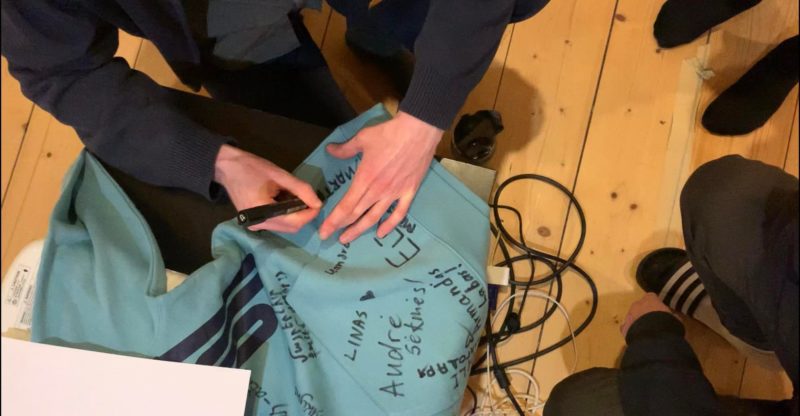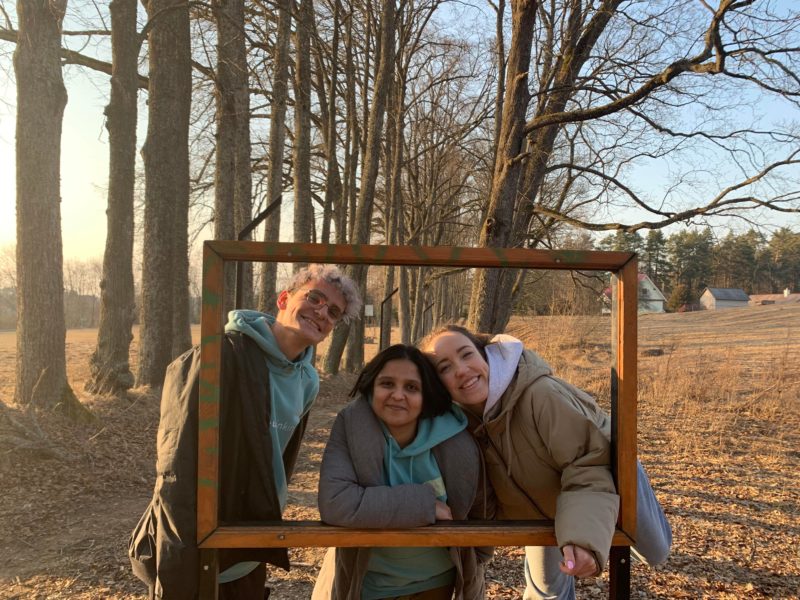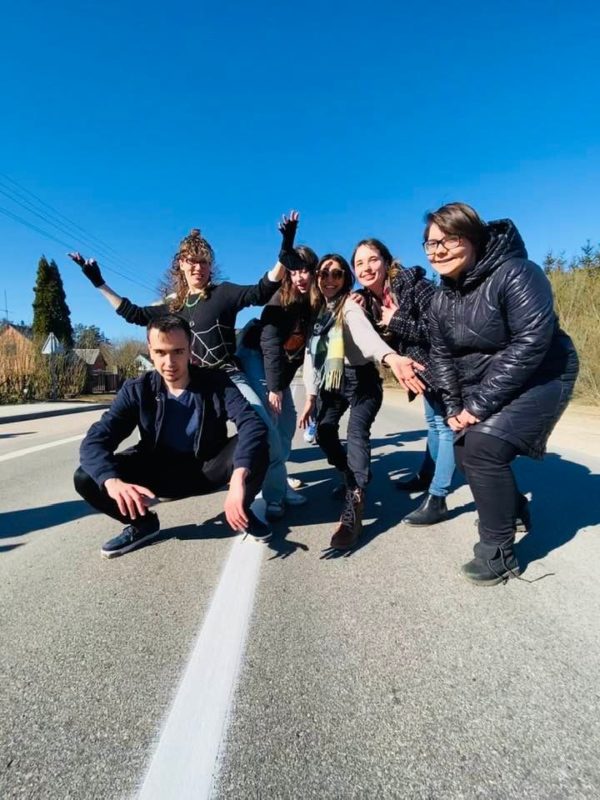“Life-changing experience!”, “Unique and diverse programme!”, “Amazing opportunity!” – these are just a few of the quotes from participants who took part in the most recent Erasmus programme in Lithuania.

The European Youth Press programme had an increasingly popular research topic – media literacy. It included participants from Lithuania, Latvia, Slovakia, Germany, Finland, Ukraine and the UK.
The first day of activities starts early in the morning. Participants would have to choose whether they agree or disagree with a statement such as “Should older people have to give up their jobs to provide opportunities to younger people?” Some of the statements sparked discussions that carried on even during the break: “Usually you hear that young people are our future but I would like to hear – young people are our present!”, a quote by Thomas Balčiūnas, a participant from Lithuania.

A key point in the programme was the lecture on Information crisis and platform awareness where everyone was introduced to the main subject of the day. Participants obtained knowledge which would later serve to inspire creative thinking and improve problem-solving skills.
The follow-up task required everyone to get into three teams and come up with innovative ways to describe the three main points in media literacy – attention engineering, content filtering and personalization, and user surveillance.
Informing people about the way media works is essential as it helps people understand the way media works and the messages it tries to send across. It’s being able to critically analyse what you see or read on any news or social platform. It also helps to look at information from different angles and perspectives. The countless sources of information today make it necessary for people to be able to identify reliable sources and tell what is the truth.

Using online tools to verify the information and avoid the spread of fake news is also a very important skill for journalists nowadays and was something that was discussed thoroughly during the programme by lecturer Harutyun Tsatryan. For example using browser extensions like CaptainFact, which is a tool made for fact-checking and verifying content on the internet. When checking images using reverse image search tools can help show you if the content you are verifying is original – like TinEye or Google Reverse Image Search.
Also covered in detail was the topic of fake news and the desire to move away from this term since according to a researcher at Tampere University and lecturer at the programme – Guna Spurava, it “[..] is a very complex issue and the term is not able to identify it fully”. So instead she suggests we should educate ourselves on what the terms misinformation, disinformation and misinformation mean and use them accordingly.
As the days are packed tight with fruitful activities and workshops, taking walks on local nature paths can help process the information and settle down thoughts. A group hike led by a local villager provided an opportunity to stretch the legs out, explore the surroundings and find out more about the area.
The Antaliepte village is situated in the northern part of Lithuania, the exact place where two rivers meet. Antaliepte gets its name from the many bridges that cross the rivers in the area. There is also a monastery situated within the village and is the place where participants had their meals.
The atmosphere of the local area where participants spent their days opened the door for creativity and working space in nature. The place inspired the development of social innovations and new opportunities.
Delicious meals like “cepelinai” – a Lithuanian national dish, prepared by local volunteers that maintain the site were cooked every day and served in the monastery near the main building.
After an enjoyable dinner, some evenings participants would indulge in screenings of documentaries related to the topic that served as a perfect way to end the busy days. Films like “The Social Dilemma” raises awareness of the impact of social media that businesses use in an attempt to influence our opinion and perspective.
One of the definite highlights of the event was a session in the Human Library. At the Human Library, you borrow real people. It aims to identify people’s prejudices by helping them to talk to people they won’t normally meet in their everyday life. The Human books included topics such as ethnicity, mental health, disabilities, social status and religion. Having an open conversation about the most intimate details of someone’s extraordinary life is a rare experience and required great effort from the organisational team.
One of the participants from Germany, Hagop Assadourian, described the activity as a “life-changing experience”.
“Sometimes you can read and feel their painful story more from their eyes rather than any words written or spoken.”

On the journalism side of things, communication with vulnerable people is a learning point for any future interview that might be done and for discovering new approaches when covering sensitive topics.
Guest lecturer, Martin Maska, covered topics such as interactive online tools that journalists can use to engage the audience in the story and improve on basic presentation. To make a presentation of a historic site participants were advised to use Jumièges 3D dans. Examples of media libraries that incorporate numerous materials and are presented in an engaging way: ClassDojo Trainings, Dáme to! Listening: Open Questions – ČT edu, Online živá knižnica (www.onlinezivakniznica.sk).
The practical assignment of the day was to craft a story plan and come up with a sensitive topic to cover through a platform of choice. Some examples were related to ethnic minorities, racism, social inequality and many more. Participants had to then pitch their stories before moving on to executing the ideas. The activity was not limited to this day only but work would continue on projects even after the programme had ended.
Anu Goswami, a participant from Finland, has decided to cover the topic of domestic violence in the UK and how it relates to football and COVID. She’s chosen to present her story in the form of a one-off podcast since it would help people suffering from domestic violence to share their experience without being videotaped.
The farewell programme, always a bittersweet goodbye, included drawing profiles of each other, putting on theme sketches and of course evaluating the experience.
For a participant from Latvia, Adelina Ziemele, the main benefit was something different to all the rest.
“No matter how much I value the knowledge and skills I gained during the project, the main benefit is the people I met. There is nothing more valuable than meeting people from different cultures together in one place but with similar interests and aims. These people broadened my horizons – I formed new friendships for life!”
Author: Ralitsa Pashkuleva


